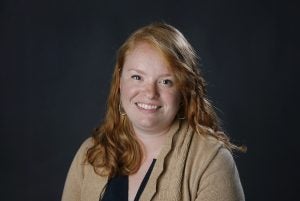 Chloe Johnson has had a passion for storytelling since she began writing for her high school newspaper. “I joke that I’m a pretty nosey person,” says Johnson, whose natural curiosity set her on a career path in journalism. A graduate of American University with a BA in journalism, she now works as a coastal environment and climate change reporter for the Post & Courier in Charleston, South Carolina, a city caught in the crosshairs of the climate crisis.
Chloe Johnson has had a passion for storytelling since she began writing for her high school newspaper. “I joke that I’m a pretty nosey person,” says Johnson, whose natural curiosity set her on a career path in journalism. A graduate of American University with a BA in journalism, she now works as a coastal environment and climate change reporter for the Post & Courier in Charleston, South Carolina, a city caught in the crosshairs of the climate crisis.
“I love the environment beat and I think it’s really important,” says Johnson, an alumna of Metcalf Institute’s 2019 Annual Science Immersion Workshop for Journalists. “It makes me think differently about the natural world and how we’re interacting with it.”
A visit to Charleston during its oyster-roasting season highlights the importance of a healthy coastal ecosystem to the city’s reliance on tourism and the seafood industry. “You cannot separate Charleston from its low landscape and the matrix of streams and marshes around the city, and what that does to the food and the culture,” she says. “I want people to understand how the environment interacts with the city, and how the city interacts with the environment.”
Charleston’s deep connection to the coast not only supports its rich culinary tradition; it also puts the city on the frontlines of climate-induced hazards such as sea level rise and coastal flooding, a reoccurring topic of Johnson’s reporting. “Charleston’s had flooding issues since time immemorial because of the low topography, which is made worse by sea level rise and more intense rainfalls,” she explains. “I hope that through my work people can see what their public officials are doing or not doing to fix the environmental problems from climate change that we face here,” says Johnson. For example, one story by Johnson focuses on recommendations by the South Carolina Flood Commission to address “chronic, worsening problems of sea surge and swamped rivers overwhelming South Carolina’s public buildings, utilities and homes.”
In a state that is generally conservative, Johnson sometimes runs into climate change denial, but she forges ahead undeterred. “I’m going to give readers accurate information, and the fact is that the vast majority of the scientific community agrees on what’s happening with climate change,” she says. In fact, she has noticed an increase in public interest and concern about the challenges she writes about. “We have had a succession of severe storms in the past five years, affecting different areas of the state, most of them affecting Charleston in some way,” she says. People are increasingly aware of the reality that the benchmarks are moving, the seas are rising, and rains are getting worse,” she says.
As Johnson dives into these issues, she reflects on just how important Metcalf’s workshop has been in helping to inform her reporting and understand how scientists conduct their research. “It was a great opportunity to stop and learn about the beat,” she says. “I feel like it added a year of experience in my understanding of coastal and environmental issues.”
As for the future, Johnson will continue to use those skills to inform her readers about the ever-increasing issue of coastal flooding in Charleston and the search for solutions.
Read more alumni profiles